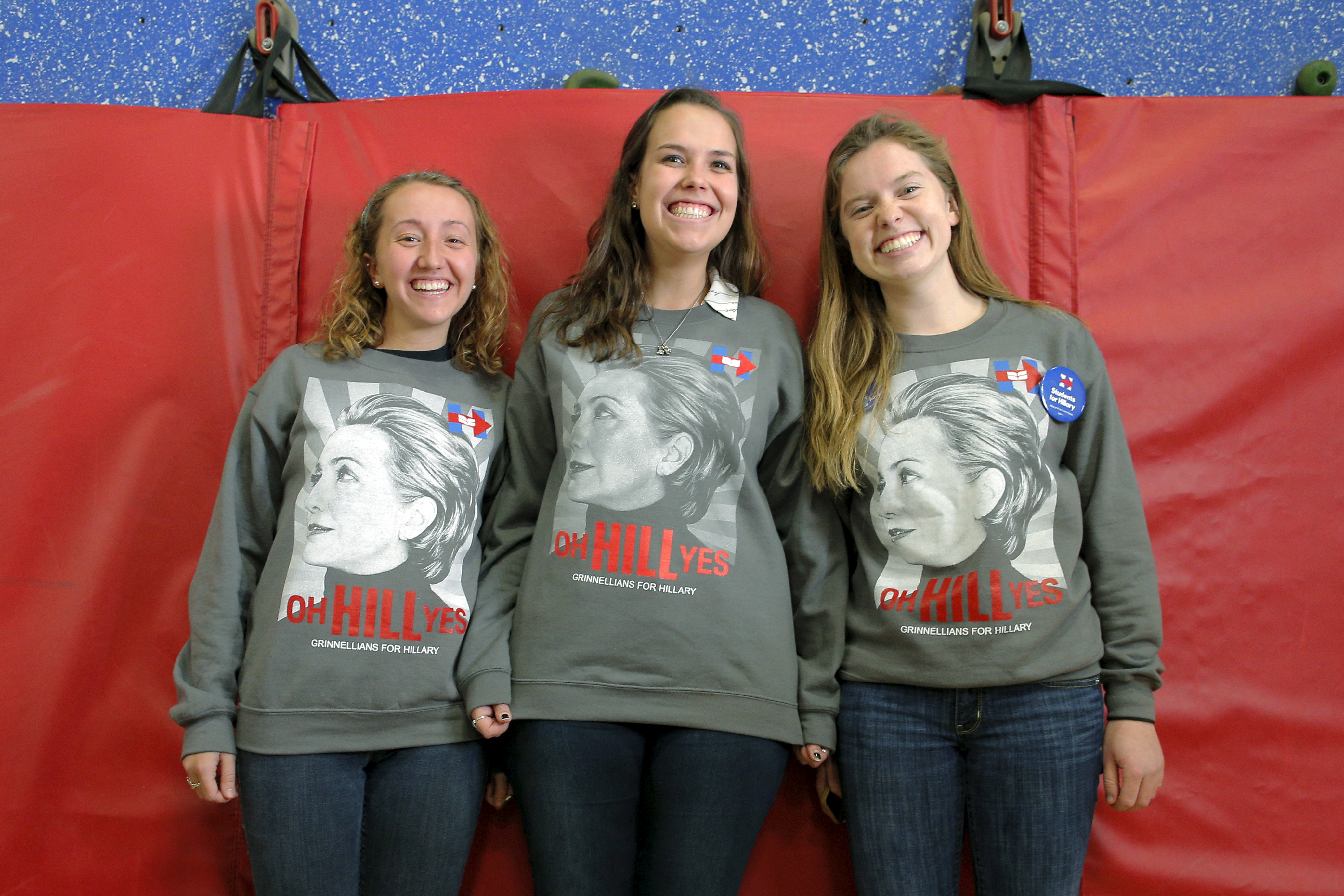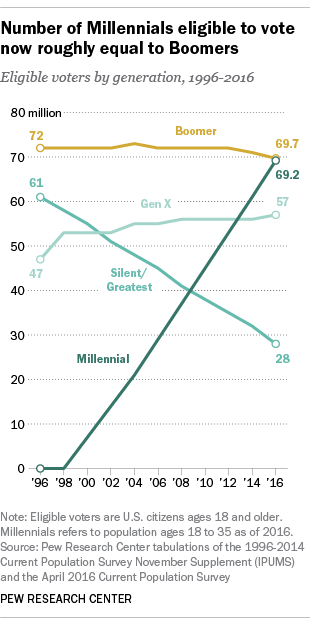Hillary Clinton is struggling. But millennials aren't to blame.
Roughly half of young voters aren't with her. But that doesn't mean they are with him.


A free daily email with the biggest news stories of the day – and the best features from TheWeek.com
You are now subscribed
Your newsletter sign-up was successful
The relatively recent fixation on name-brand generations — the Greatest/Silent Generation, the Baby Boomers, Generation X, the Millennials — is a convenient way of generalizing broad societal changes in an especially turbulent and fast-moving half century of American global dominance. But it's also reductive, a frequently lazy crutch designed to sow division and play up differences rather than emphasize our broad commonalities.
Personally, I blame the boomers for this.
The current "it" generation of commerce and politics is, of course, millennials. It's easy to grasp why. Fiercely courted and widely maligned, the millennials — voters 18 to 35 years old, born after 1980 — "already have surpassed baby boomers as the United States' largest living generation," Pew noted recently, and "have caught up to the boomers when it comes to their share of the American electorate." Democrats have long counted on younger voters as a key, if fickle, part of their winning coalitions; President Obama won 68 percent of the millennials in 2008 and 60 percent in 2012. Hillary Clinton is faring significantly worse among this studied-to-death cohort.
The Week
Escape your echo chamber. Get the facts behind the news, plus analysis from multiple perspectives.

Sign up for The Week's Free Newsletters
From our morning news briefing to a weekly Good News Newsletter, get the best of The Week delivered directly to your inbox.
From our morning news briefing to a weekly Good News Newsletter, get the best of The Week delivered directly to your inbox.

Clinton's low-water mark is probably a recent Quinnipiac poll that measures her millennial support at just 31 percent, only 2 percentage points higher than Libertarian candidate Gary Johnson and 5 points above Donald Trump. At least Clinton hopes that's a low-water mark. She knows she has a millennial problem, and is trying to fix it.
Meanwhile, some Democrats are furious with millennials for potentially throwing the race to Donald Trump.
Several older Democrats, with nightmare visions of the 2000 election dancing in their heads, have even taken to tweeting out their exasperation — then oftentimes quickly deleting the 140-character frustrations because, for one thing, millennials are just better at social media. Twitter is not a smart place to vent about them.
For anyone who doesn't want Trump to win in November, the millennial malaise regarding Hillary Clinton really is a big problem. But that does not mean it is fair or smart to blame millennials for Trump's recent good fortune in the polls.
A free daily email with the biggest news stories of the day – and the best features from TheWeek.com
For one thing, just because roughly half of young voters aren't with her doesn't mean they are with him. In fact, Trump is especially unpopular with millennials — roughly 75 percent of them view him unfavorably, at least 65 percent say he is racist, and in a recent George Washington University Battleground Poll, two-thirds of millennials said they would never even consider voting for Trump. "If people want to start hectoring generations, hector the a--holes that are actually going to vote for Trump," says Duncan "Atrios" Black, referring to the baby boomers, Trump's great firewall.
Brian Beutler at The New Republic is on the same page: "Blame the boomers." Millennials don't seem to be enthralled with Clinton, but even in that terrible Quinnipiac poll, millennials are more supportive of Clinton in a two-way race than any other age cohort (it's only when you add in Johnson and Jill Stein, the Green Party nominee, that millennials drop to the lowest Clinton support group).
Secondly, as my colleague Ryan Cooper notes, "scolding people is unlikely to work as a vote-getting strategy." Millennials, understandably, seem to resent being lumped together and talked down to by their elders. Gen Xers, many of whom cast our first ballots for President Bill Clinton, were half-heartedly serenaded with a "Rock the Vote" campaign. Millennials can be excused for exasperatedly rolling their eyes over the misguided "69 the Vote" campaign and exhortations to share their political views with emojis.
There are lots of theories on why millennials appear to have abandoned Clinton in droves over the past month. It seems likely that many of them, seeing Clinton's commanding lead in the polls in August, felt comfortable flirting with Johnson and will vote for the Democrat in November once the reality of President Trump sinks in — though it's also possible that enough of them dislike or distrust Clinton that they'll stay home or vote for a third party, maybe in numbers large enough to tip the election to Trump.
It seems reasonable to remind voters who were in preschool in 2000 that Bush v. Gore brought them many of the things they dislike about Washington and the world. And Clinton is undoubtedly smart to try and win over the millennial generation and urge them to flout expectations and actually vote — even if she needs to call on Sen. Bernie Sanders (I-Vt.), Michelle Obama, Sen. Elizabeth Warren (D-Mass.), and maybe even all those millennial-friendly celebrities to make that case.
Blaming millennials, though, is self-defeating and unfair. If Trump wins, there will be plenty of blame to go around. So you lefty boomers, if you must curse the apathy or naiveté of vote-wasting millennials, do it amongst yourselves, offline and out of earshot. Not that anyone ever listens to us Gen Xers, anyway.
Peter has worked as a news and culture writer and editor at The Week since the site's launch in 2008. He covers politics, world affairs, religion and cultural currents. His journalism career began as a copy editor at a financial newswire and has included editorial positions at The New York Times Magazine, Facts on File, and Oregon State University.
-
 Quentin Deranque: a student’s death energizes the French far right
Quentin Deranque: a student’s death energizes the French far rightIN THE SPOTLIGHT Reactions to the violent killing of an ultra-conservative activist offer a glimpse at the culture wars roiling France ahead of next year’s elections.
-
 Secured vs. unsecured loans: how do they differ and which is better?
Secured vs. unsecured loans: how do they differ and which is better?the explainer They are distinguished by the level of risk and the inclusion of collateral
-
 ‘States that set ambitious climate targets are already feeling the tension’
‘States that set ambitious climate targets are already feeling the tension’Instant Opinion Opinion, comment and editorials of the day
-
 The billionaires’ wealth tax: a catastrophe for California?
The billionaires’ wealth tax: a catastrophe for California?Talking Point Peter Thiel and Larry Page preparing to change state residency
-
 Bari Weiss’ ‘60 Minutes’ scandal is about more than one report
Bari Weiss’ ‘60 Minutes’ scandal is about more than one reportIN THE SPOTLIGHT By blocking an approved segment on a controversial prison holding US deportees in El Salvador, the editor-in-chief of CBS News has become the main story
-
 Has Zohran Mamdani shown the Democrats how to win again?
Has Zohran Mamdani shown the Democrats how to win again?Today’s Big Question New York City mayoral election touted as victory for left-wing populists but moderate centrist wins elsewhere present more complex path for Democratic Party
-
 Millions turn out for anti-Trump ‘No Kings’ rallies
Millions turn out for anti-Trump ‘No Kings’ ralliesSpeed Read An estimated 7 million people participated, 2 million more than at the first ‘No Kings’ protest in June
-
 Ghislaine Maxwell: angling for a Trump pardon
Ghislaine Maxwell: angling for a Trump pardonTalking Point Convicted sex trafficker's testimony could shed new light on president's links to Jeffrey Epstein
-
 The last words and final moments of 40 presidents
The last words and final moments of 40 presidentsThe Explainer Some are eloquent quotes worthy of the holders of the highest office in the nation, and others... aren't
-
 The JFK files: the truth at last?
The JFK files: the truth at last?In The Spotlight More than 64,000 previously classified documents relating the 1963 assassination of John F. Kennedy have been released by the Trump administration
-
 'Seriously, not literally': how should the world take Donald Trump?
'Seriously, not literally': how should the world take Donald Trump?Today's big question White House rhetoric and reality look likely to become increasingly blurred
